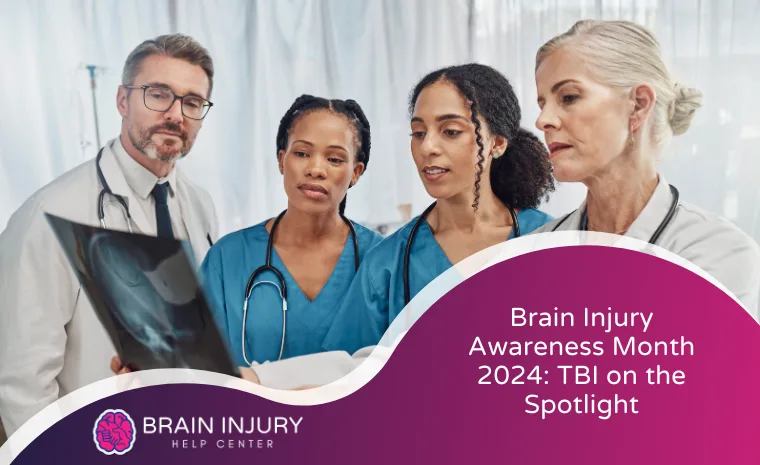As Brain Injury Awareness Month starts, it serves as a poignant reminder of the profound impact traumatic brain injuries (TBIs) have on individuals, families, and communities, bringing attention to their often life-altering consequences, and the imperative need for increased understanding, prevention, and support.
Traumatic brain injuries are a significant public health concern worldwide, with millions of individuals affected annually. In the United States alone, more than 586 TBI-related hospitalizations and 190 TBI-related deaths occur every day, according to the Centers for Disease Control and Prevention (CDC). Many survivors face difficult challenges in the aftermath, often grappling with profound changes in their daily lives and relationships.
For those reasons, Brain Injury Awareness Month provides a platform to elevate awareness, promote prevention strategies, and advocate for improved care and resources for TBI survivors.
In today’s blog, we will delve into the critical issues surrounding traumatic brain injuries, exploring their causes, consequences, legal considerations, and avenues for support. Through informative insights and expert perspectives, we aim to empower individuals with the knowledge and resources needed to navigate the complexities of TBI cases effectively.
What is Brain Injury Awareness Month?
As we have mentioned in our previous blog, Brain Injury Awareness Month is a dedicated period intended to acknowledge and enhance awareness regarding various types of brain injuries, ranging from mild concussions to severe traumatic brain injuries. This month underscores endeavors toward injury prevention, illuminates the challenges encountered by survivors, and showcases recent advancements in research and treatment. Throughout March, a multitude of events, campaigns, and initiatives are organized to amplify the voices of survivors and educate the public about brain injuries and strategies for prevention.
Brain Injury Awareness Month originated from advocacy movements seeking to spotlight the often-overlooked injuries many individuals experience. Through collaborative efforts involving survivors, caregivers, healthcare professionals, and advocates, the event has evolved, extending its influence to foster a culture of comprehension, compassion, and enhanced care for patients with brain injuries.
The Impact of TBI on Accident Victims
TBIs can have profound and multifaceted effects on a victim’s life, encompassing both the physical and emotional sides. Physically, TBIs can manifest in various ways, including headaches, dizziness, fatigue, sensory disturbances (such as blurred vision or ringing in the ears), and motor impairments (such as difficulties with coordination or balance).
In cases of moderate to severe TBIs, they can cause pronounced physical disabilities, including paralysis, spasticity, and chronic pain. These physical challenges can significantly impact an individual’s ability to perform everyday tasks, engage in activities they once enjoyed, and maintain independence.
On the other hand, these severe injuries can also exert a significant emotional and psychological toll, often leading to changes in mood, behavior, and cognitive functioning. Individuals may experience heightened irritability, agitation, or mood swings, as well as difficulties with memory, concentration, and decision-making.
Depression, anxiety, and other psychiatric disorders are also common among TBI survivors, often stemming from the profound life changes and challenges they face. Moreover, the emotional impact of a TBI extends beyond the individual to their family members and caregivers, who may struggle to adjust to the changes in their loved one’s personality and functioning.
The combination of physical and emotional effects can create a complex and challenging landscape for TBI survivors to navigate. Raising awareness about traumatic brain injuries, advocating for improved access to healthcare and support services, and fostering a supportive community for survivors are crucial steps in mitigating the long-term impact of these injuries.

Why Advocacy for TBI Victims Matters
Advocacy for traumatic brain injury victims is vital in ensuring they receive the support, resources, and justice they deserve. In California, various organizations, legal services, and advocacy groups are dedicated to championing the rights and well-being of TBI survivors.
- Legal Help: One significant avenue for advocacy is through legal representation. TBI victims may face complex legal issues, particularly if their injury resulted from motor vehicle accidents or negligence. Brain injury attorneys specialize in advocating for TBI survivors in legal proceedings, such as personal injury claims, medical malpractice cases, or disputes related to disability benefits. These attorneys play a crucial role in helping TBI victims navigate the legal system, obtain compensation for their injuries, and hold responsible parties accountable.
- Support Organizations: Additionally, advocacy organizations and support groups in California provide valuable resources and assistance to head injuries survivors and their families. These organizations raise awareness about TBIs, advocate for policy changes to improve TBI prevention and medical care, and offer support services tailored to the unique needs of TBI survivors. For example, the Brain Injury Help Center is dedicated to providing legal support and advocacy for people with brain injury.
- Community Approach: In addition to legal and organizational support, TBI victims in California can benefit from community-based resources and initiatives aimed at enhancing their quality of life. Local community centers, recreational programs, and adaptive sports organizations offer opportunities for socialization, skill-building, and participation in recreational activities tailored to individuals with disabilities, including TBIs.
Your Traumatic Brain Injury Matters
Overall, advocacy for TBI victims in California encompasses a multifaceted approach, involving legal representation, organizational support, healthcare services, and community-based initiatives. By raising awareness, providing resources, and advocating for the rights of TBI survivors, we strive to create a supportive and inclusive environment where individuals affected by brain injury can thrive and achieve their full potential.









